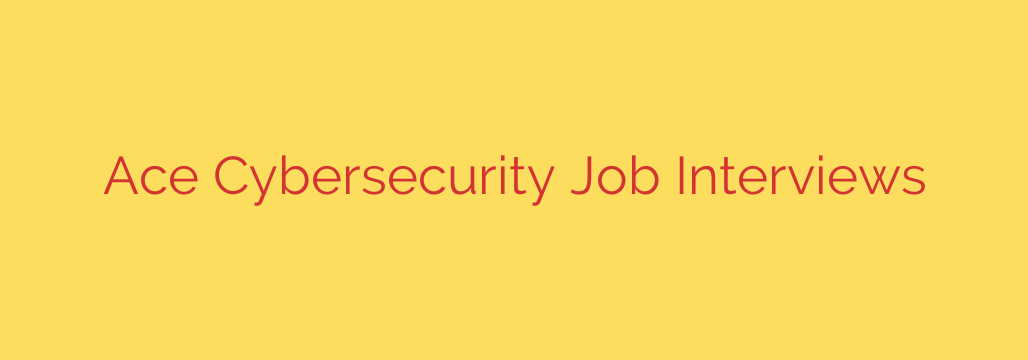
Nailing the Cybersecurity Interview: Expert Tips for Landing Your Dream Job
The cybersecurity field is booming, but the competition for top roles is fiercer than ever. A strong resume might get your foot in the door, but it’s your performance in the interview that will secure the offer. Landing a job in this high-stakes industry requires more than just technical knowledge; it demands a demonstration of critical thinking, problem-solving under pressure, and a proactive security mindset.
Whether you’re aiming for a role as a SOC analyst, penetration tester, or security architect, a well-prepared interview strategy is non-negotiable. This guide provides a comprehensive roadmap to help you navigate the process with confidence and prove you’re the right candidate for the job.
Phase 1: The Foundation is Flawless Preparation
Showing up with only a surface-level understanding of the company is a critical mistake. True preparation goes beyond reading the “About Us” page.
- Deconstruct the Job Description: Print out the job description and highlight every required skill, tool, and responsibility. Prepare a specific example from your experience or studies for each point. If they mention SIEM tools, be ready to discuss your experience with Splunk or QRadar. If they list “incident response,” have a story ready about how you handled a simulated or real-world security event.
- Research Their Security Posture: Investigate the company from a security perspective. Have they had any public breaches? What industry are they in, and what are the common threats for that sector (e.g., ransomware for healthcare, DDoS for e-commerce)? Mentioning your awareness of industry-specific threats shows you think like a seasoned professional.
- Understand Their Mission: Connect your skills to the company’s goals. Frame your answers around how you can help them protect their data, maintain customer trust, and support their business objectives.
Phase 2: Mastering the Technical Gauntlet
Technical questions are designed to test the depth and breadth of your knowledge. While you can’t predict every question, you can master the core concepts that are almost certain to come up.
Be prepared to explain fundamental principles clearly and concisely. Common areas of focus include:
- Networking Fundamentals: Expect questions about the OSI model, TCP/IP, common ports (like DNS, HTTP/S, RDP), and the difference between TCP and UDP. Be ready to explain not just what they are, but why they matter for security. For example, explain how a firewall operates at different layers of the OSI model.
- Core Security Concepts: You must be able to articulate the differences between threats, vulnerabilities, and risks. Be fluent in explaining concepts like encryption vs. hashing, symmetric vs. asymmetric encryption, and the purpose of a digital signature.
- Incident Response: Many interviews will include a question like, “Talk me through the steps you would take if you suspected a host on your network was compromised.” Be familiar with the standard incident response lifecycle: Preparation, Identification, Containment, Eradication, Recovery, and Lessons Learned.
- Common Tools: While you don’t need to be an expert in everything, you should be able to discuss the purpose of key tools like Wireshark, Nmap, Metasploit, and SIEM platforms.
Phase 3: Excelling at Behavioral and Situational Questions
This is where interviewers gauge your soft skills, problem-solving abilities, and cultural fit. They want to know how you handle challenges, not just that you have the technical skills to do so.
For behavioral questions (“Tell me about a time when…”), the STAR method (Situation, Task, Action, Result) is your most powerful tool. It provides a structured way to deliver a compelling and complete answer.
- Situation: Briefly describe the context.
- Task: Explain your specific responsibility or goal.
- Action: Detail the concrete steps you took to address the situation.
- Result: Quantify the outcome. What was the impact of your actions?
For situational questions (“What would you do if…”), the interviewer is testing your thought process.
- Scenario: “You see unusual outbound traffic from a database server late at night. What do you do?”
- Your Response: Don’t just give a one-sentence answer. Walk them through your logic. “First, I would verify the traffic’s destination and protocol. Is it going to a known, legitimate IP? I would then check the server’s logs for any corresponding suspicious processes or user activity. My next step would be to cross-reference this with our threat intelligence feeds. I would prioritize containment to prevent potential data exfiltration while continuing the investigation…” This demonstrates a calm, methodical, and defensible approach.
Phase 4: Demonstrate Your Passion for the Field
The best cybersecurity professionals are lifelong learners. Interviewers want to see that you are genuinely passionate about security, not just collecting a paycheck.
- Talk About Your Home Lab: If you have one, describe it. Explain how you use it to test new tools, analyze malware in a safe environment, or practice defensive techniques. This is a powerful indicator of your personal drive.
- Discuss How You Stay Current: Mention specific security blogs, podcasts, or researchers you follow. Talk about a recent vulnerability (like a specific CVE) that you found interesting and explain its potential impact. This proves you are actively engaged with the evolving threat landscape.
Phase 5: Ask Insightful Questions
The end of the interview is your opportunity to show you’re not just looking for any job, but for the right job. The questions you ask reveal your priorities and level of understanding. Avoid generic questions about company culture. Instead, ask targeted, security-focused questions.
- “How does the security team collaborate with the development and operations teams?”
- “What is the company’s approach to security training for non-technical employees?”
- “Could you describe the typical incident response process here?”
- “What are the biggest security challenges the team is currently facing?”
By preparing thoroughly across these key areas, you can transform a stressful interview into an opportunity to showcase your expertise, your problem-solving skills, and your passion for protecting digital assets. Confidence comes from preparation, and in the world of cybersecurity, a prepared candidate is an invaluable one.
Source: https://www.helpnetsecurity.com/2025/10/06/cybersecurity-job-interview-tips/








